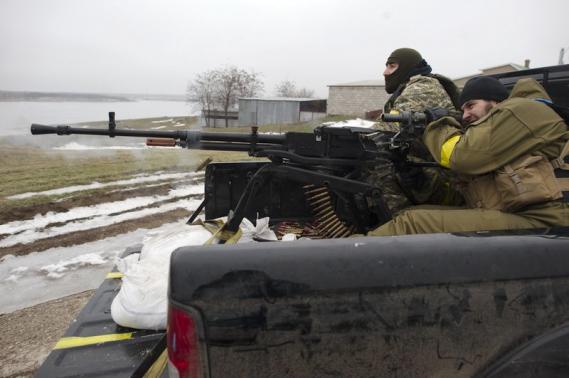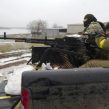
Amid Mounting Domestic Troubles, Putin Tries to Regain the Initiative in Eastern Ukraine
Publication: Eurasia Daily Monitor Volume: 12 Issue: 15
By:

The sharp escalation of hostilities in eastern Ukraine last week (January 22) has disheartened many in Europe who had hoped for a gradual resolution of the Ukraine conflict. On the other hand, it has been a welcome return to the path of victory for many in Russia who consume or produce the flow of war propaganda. For some observers, the fragility of the ceasefire and the impossibility of “freezing” the conflict in the present configuration were beyond doubt, so the question that is looming large in the commentary is not “Why?” but rather “Why now?” (Nezavisimaya Gazeta, January 23).
The meeting of foreign ministers of Germany, France, Russia and Ukraine (see EDM, January 22, 23) was supposed to make a small contribution to managing the low-intensity clashes; but in fact, their get-together merely registered the lack of readiness to compromise (Novaya Gazeta, January 23). One advantage of this negotiations format, usually referred to as the “Normandy” group because it was first established at the summit in France last June, is that it does not involve the Moscow-backed rebels. The pro-Russia separatists’ claims about expanding the offensive to the western borders of Donetsk and Luhansk provinces are indeed of little import because the decision-making on every step forward is done in Moscow (Gazeta.ru, January 23).
President Vladimir Putin persists in denying any responsibility and keeps playing the blame game, even opening the meeting of his Security Council with a “moment of silence” in memory of those killed in Donetsk (Kremlin.ru, January 23). At this point, the Kremlin seems to be completely disregarding the fact that it can no longer camouflage the presence of hundreds of Russian tanks in the separatist-controlled enclave or that the shelling of Mariupil last Saturday was done by Russian heavy artillery (Newsru.com, January 24). The only thing that matters, apparently, is the demonstrated ability to prevail over the Ukrainian army, which revives the illusion that Putin is in control over the course of the conflict (Meduza, January 22). Moderate Russian commentators argue that such a demonstration makes possible a new pause in hostilities, but they are at a loss trying to find an explanation for Putin’s urge to undertake a new offensive (Gazeta.ru, January 22). He was not committed to a round of talks with European peers and had no reason to expect any softening of sanctions, so there was no particular need to play hardball, they argue (RBC.ru, January 22).
What may have compelled Putin to break the ceasefire was the plain statement by US President Barack Obama in his State of the Union address last Tuesday (January 20) that the Russian economy was “in shambles” (Kommersant, January 22). Many Russian politicians felt obliged to openly reject such a denigrating assessment, while nobody seemingly took offense at Obama’s point about Russia behaving like a bully (Moskovsky Komsomolets, January 22). Perhaps the most peculiar twist to this tale was added at the World Economic Forum in Davos, Switzerland, where Deputy Prime Minister Igor Shuvalov admitted that the Russian economy had entered into a deeper and more complex crisis than in 2009, but declared that the coming hardships would unite Russians even more around Putin (Kommersant, January 24). Though the declaration was little more than a ritualistic loyalty pledge, its conclusion that the crisis could only be overcome with deep and painful reforms indicates that Putin’s opinion on waiting until global oil prices climb back in a year or two is not quite shared by the business elites (RBC.ru, January 23).
The government has produced an anti-crisis program that mostly includes channeling money from reserve funds into various gaps caused by capital flight, which reached $150 billion in 2014 (Slon.ru, January 22). These disbursements, however, cannot compensate for the sharp contraction in Russian investment activities caused by forbiddingly high economic risk estimates and the non-existent profits that are being forecast for most Russian businesses (Moscow Echo, January 24). And while the finance ministry seeks to apportion rescue funds to both military rearmament and social programs, privileged corporations—such as state-owned oil giant Rosneft, headed by Putin’s confidant Igor Sechin—continue to present the government with new demands for covering their enormous debts (Vedomosti, January 23). Russia still has solid financial reserves, even if Putin tends to exaggerate their size. But when the main content of Moscow’s economic policy shifts towards spending them, it is safe to predict that these reserves will evaporate much faster than economic experts now calculate.
For compromise-cherishing European politicians as well as for big business, which has flocked to Davos, the conclusion to this unfolding economic disaster is clear beyond doubt: Moscow has to curtail its aggressiveness and retreat from the Ukraine deadlock. Yet, this common sense fails completely to connect with the decision-making apparatus in the Kremlin; and wise words from Russian technocrats to turn the crisis into an opportunity for reforms are also being entirely disregarded (Vedomosti, January 23). In the much reduced circle of Putin’s confidants, a different mindset rules. They appear to be firmly fixated on the logic of confrontation and play into their boss’s superiority complex and his fear to show any sign of weakness. Each time Putin attempted to perform any backpedaling, the situation in the war zone turned bad for the rebels. Meanwhile, pressure from the West for more concessions is intensifying. And in mid-December 2014, the near-collapse of the ruble revealed the makings of a severe economic contraction in Russia, which is further aggravated by the panicky flight of deeply corrupt “loyalists.”
Putin has had about a month to internalize this perspective, and Obama’s words perhaps hit a raw nerve in his painful reckoning with the reality of Russia’s weakness. The urge to divert attention to a different disaster in the making—in eastern Ukraine—may have been overwhelming, thus pushing Putin to make use of the only reliable tool left at his disposal, military force. Ukraine has suffered yet another defeat, but its democratically elected leadership looks poised to persevere and to gain a new measure of support, both domestically and in the war-averse but security-committed Europe. With all its military setbacks and economic devastation, Ukraine as a whole is not in shambles, repeatedly disproving the power calculations in the Kremlin. Russia, to the contrary, is sinking deeper into the quagmire of decline and isolation, despite all its fitful attempts at projecting crude power. It may try to defy economic gravity by whipping itself into an anti-Western frenzy through vicious propaganda, but a crash landing will yet again leave observers with the “Why now?” question.




